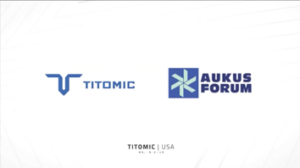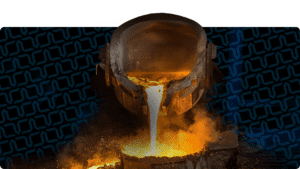At the Advanced Manufacturing Industry 4.0 Hub, located at Swinburne University’s Factory of the Future, Titomic’s TKF 9000 system has made it possible to produce lighter, stronger, production-ready rapid tooling for a range of aerospace applications.
In an increasingly competitive and challenging climate, manufacturers must produce high-performance parts more efficiently and effectively than ever – while maximising uptime and profit.
However, traditional tooling for composite manufacturing can take months to produce, with long lead times resulting in extended downtime and lost revenue. At the same time, manufacturing tooling from a billet is considered wasteful, since a large amount of material must be removed from the billet to reach the final specified shape.
To combat these challenges within aerospace applications, Titomic created a titanium tooling mould for manufacturing carbon fibre ribs at the Swinburne-CSIRO Advanced Manufacturing Industry 4.0 Hub – which hosts an extensive capability including press tools, carbon layups, and testing and analysis equipment.
Breaking the mould
Using the TKF 9000 additive manufacturing system together with Titomic Kinetic Fusion (TKF) technology, Titomic created a near-net shape in just three weeks with minimal tooling (compared to up to 16 weeks using traditional techniques), resulting in a significant reduction in lead times, material waste and overall cost.
“This is a very novel approach using cold spray technology for production-ready rapid tooling across aerospace applications,”
Jimmy Thomas, Facility Manager at the Advanced Manufacturing Industry 4.0 Hub.
“Not only is the tooling lightweight for handling and offers excellent polishability and mould line surface durability, we also noticed it doesn’t need as many chemical mould release and cleaning agents compared to other aerospace-grade tooling materials.”
With a lower thermal mass and more thermal conductivity, the tool promises faster ramp rates to improve cycle time. It’s also more corrosion and wear resistant, so is less likely to chip or be eroded during the carbon fibre manufacturing process – while also maintaining its shape for longer when exposed to oxidation during storage.
“Since Titanium offers a durable surface and is highly corrosion-resistant, there’s less tool preparation between cures or after a period of storage, compared with steel or Invar tooling which will rust and need restoration if it’s taken out of service for any period of time,” says Max Osborne, Head of Engineering at Titomic.
It’s also worth noting that titanium’s coefficient of thermal expansion (CTE) is significantly lower than aluminium, making it more suitable for fabricating parts up to a few metres long.
Manufacturing ramps up
The tool was additively manufactured from Green Titanium powder fabricated from a titanium sponge, making it cost-competitive with a significantly shorter lead time when compared to traditional billets.
“Titanium is a great material solution for small-to-medium-sized composite mould tooling, where ramp rates and cure times are constrained by tool thermal mass and/or the equipment’s heating and cooling capacity,” Max says.
“With thermoplastics, you essentially heat ’em, set ‘em and cool ’em as fast as possible. And so the engineering challenge moves to one of tooling and equipment design to allow this to occur as fast as possible – which is where strong, stiff, low mass and high-conductivity tooling such as titanium has benefits.”
The right tool for the job
Since production, the tool has produced over 30 carbon fibre components at the Advanced Manufacturing Industry 4.0 Hub, with almost no signs of wear.
“No perfect tooling material exists,” Max remarks. “Selection is a trade-off of mass, conductivity, CTE, cost and other factors. But for the test lab application, titanium was a great fit.”
Case study snapshot
What:
Titanium tooling mould for carbon fibre ribs in aerospace applications
Where:
Swinburne-CSIRO Advanced Manufacturing Industry 4.0 Hub
How:
TKF 9000 with Green Titanium powder
Outcome:
Tool additively manufactured in just a few days, making it faster and cost-competitive compared to traditional billets – with a significantly reduced lead time.



